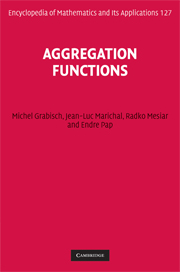Book contents
- Frontmatter
- Contents
- List of figures
- List of tables
- Preface
- 1 Introduction
- 2 Properties for aggregation
- 3 Conjunctive and disjunctive aggregation functions
- 4 Means and averages
- 5 Aggregation functions based on nonadditive integrals
- 6 Construction methods
- 7 Aggregation on specific scale types
- 8 Aggregation on ordinal scales
- 9 Aggregation on bipolar scales
- 10 Behavioral analysis of aggregation functions
- 11 Identification of aggregation functions
- Appendix A Aggregation of infinitely many arguments
- Appendix B Examples and applications
- List of symbols
- References
- Index
2 - Properties for aggregation
Published online by Cambridge University Press: 05 March 2013
- Frontmatter
- Contents
- List of figures
- List of tables
- Preface
- 1 Introduction
- 2 Properties for aggregation
- 3 Conjunctive and disjunctive aggregation functions
- 4 Means and averages
- 5 Aggregation functions based on nonadditive integrals
- 6 Construction methods
- 7 Aggregation on specific scale types
- 8 Aggregation on ordinal scales
- 9 Aggregation on bipolar scales
- 10 Behavioral analysis of aggregation functions
- 11 Identification of aggregation functions
- Appendix A Aggregation of infinitely many arguments
- Appendix B Examples and applications
- List of symbols
- References
- Index
Summary
Introduction
Studies on the aggregation problem have shown that generally the choice of the aggregation function to be used is far from being arbitrary and should be based upon properties dictated by the framework in which the aggregation is performed. For example, in some multicriteria evaluation methods, the aim is to assign an overall score to each alternative, given a set of partial scores with respect to different criteria. Clearly, it would be unnatural to give as an overall score a value that is lower than the lowest partial score, or greater than the highest score, so that only “internal” aggregation functions are allowed. Another example concerns the aggregation of opinions in voting procedures. If, as usual, the voters are anonymous, the aggregation function must be symmetric.
In this chapter we present some properties that are generally considered as relevant for aggregation. Of course, not all these properties are equally important or serve the same purpose. Some of them are imperative conditions whose violation leads to obviously counterintuitive aggregation modes. Others are technical conditions that just facilitate the representation or the calculation of the aggregation function. There are also optional conditions that naturally apply in special circumstances but are not to be universally accepted.
We first introduce some elementary mathematical properties, such as monotonicity and idempotency. Then we present algebraic properties based on grouping procedures, like associativity. We also introduce invariance properties related to the scale types of the variables being aggregated. Finally, we close the chapter with some extra properties, like additivity and such.
Information
- Type
- Chapter
- Information
- Aggregation Functions , pp. 11 - 55Publisher: Cambridge University PressPrint publication year: 2009
